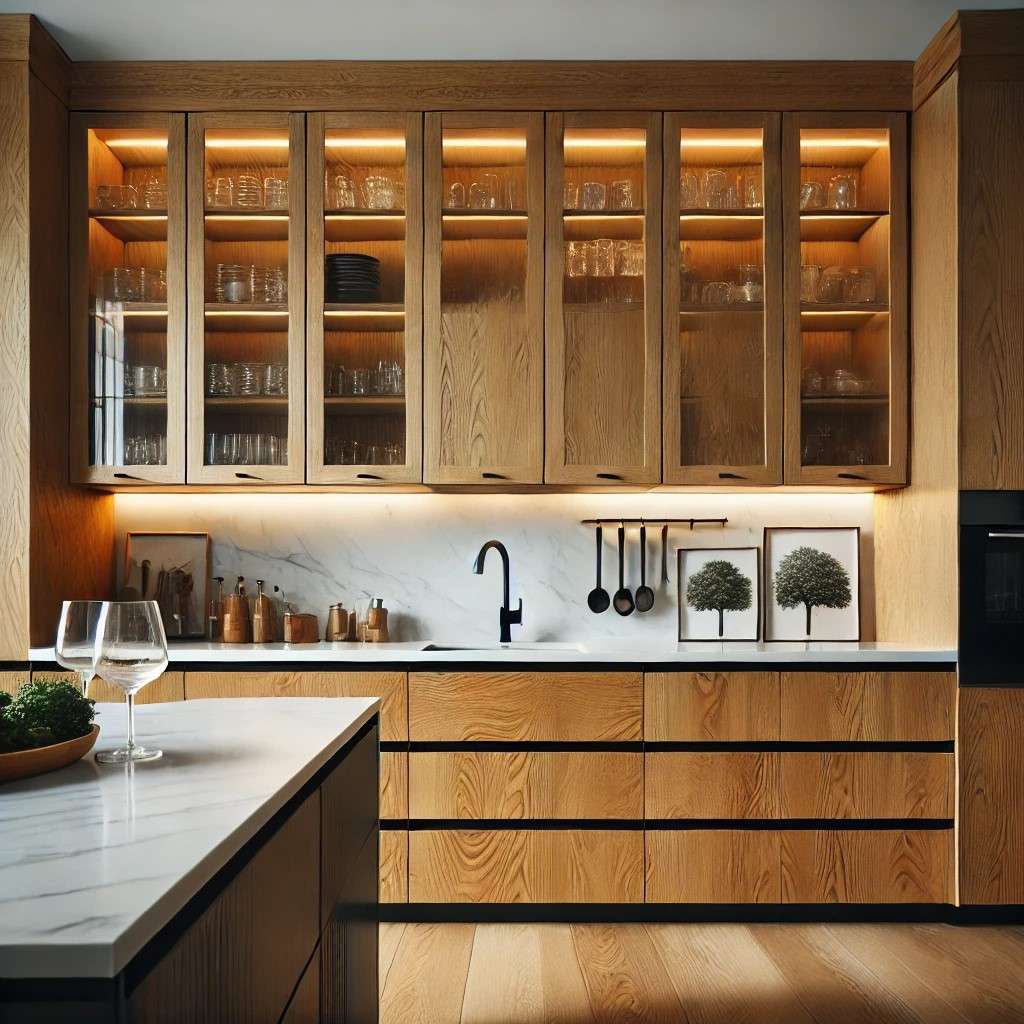
Are your kitchen cabinets looking tired and outdated? 🤔 Imagine entering your kitchen. The warm, rich tones of stained oak cabinets greet you. The natural beauty of oak, enhanced by the perfect stain, can transform your kitchen from drab to fab in no time!
But wait, there’s more to staining oak cabinets than just slapping on some color. 🖌️ From choosing the right stain to applying it, there’s a lot to consider. Don’t stress, we have you supported! This guide will teach you all about stained oak kitchen cabinets. We’ll help you make your kitchen cabinet dreams come true. We’ll cover benefits, the selection process, staining techniques, and design ideas.
So, are you ready to give your kitchen a stunning makeover? Let’s explore stained oak kitchen cabinets. You can revive your culinary space!
Benefits of Stained Oak Kitchen Cabinets
Stained oak kitchen cabinets have many benefits. This makes them a favored option for homeowners. Let’s explore the key benefits that set these cabinets apart:
A. Timeless aesthetics
Oak cabinets with a rich stain exude a classic charm that never goes out of style. Stained oak wood’s natural grain patterns create a warm, inviting kitchen. This timeless appeal ensures your kitchen remains visually appealing for years to come.
B. Durability and longevity
Oak is strong and durable. So, it is great for kitchen cabinets. When properly stained and maintained, oak cabinets can withstand:
-
Daily wear and tear
-
Moisture exposure
-
Temperature fluctuations
-
Impact from cookware and utensils
This resilience converts to an extended lifespan, minimizing the need for frequent replacements.
C. Versatility in design
Stained oak cabinets offer remarkable versatility in kitchen design. The wide range of stain colors available allows you to:
| Stain Color | Design Style |
| Light | Modern, Scandinavian |
| Medium | Traditional, Transitional |
| Dark | Rustic, Contemporary |
This flexibility lets you achieve your desired look. It preserves the natural beauty of oak wood.
D. Value addition to your home
Investing in stained oak kitchen cabinets can significantly increase your home’s value. Oak’s quality and timeless appeal often attract buyers. So, it’s a smart choice for long-term property value.
We’ve seen the benefits of stained oak cabinets. Now, let’s discuss how to choose the right stain for them.
Choosing the Right Stain for Oak Cabinets

Popular stain colors for oak.
When it comes to staining oak kitchen cabinets, certain colors have stood the test of time. Here are some popular options:
-
Golden Oak: Enhances the natural warmth of oak.
-
Cherry: Adds a rich, reddish hue.
-
Espresso: Creates a modern, dark appearance.
-
Weathered Gray: Offers a trendy, rustic look.
Matching stains with kitchen decor
Selecting a stain that complements your kitchen’s design is crucial. Consider the following factors:
-
Countertop material and color.
-
Flooring type and shade.
-
Wall paint color
-
Appliance finishes
| Kitchen Style | Recommended Stain Colors |
| Traditional | Golden Oak, Cherry |
| Modern | Espresso, Gray |
| Rustic | Weathered Gray, Natural |
Light vs. dark stains: pros and cons
Light stains:
-
Pros: Brighten the space, showcase wood grain.
-
Cons: May show dirt and wear more easily.
Dark stains:
-
Pros: Create a sophisticated look, hide imperfections.
-
Cons: Can make small kitchens feel cramped.
Testing stains before application.
Before committing to a stain color, it’s essential to test it on a small, inconspicuous area or a spare piece of oak. This allows you to:
-
Assess the true color when it is dry.
-
Determine if many coats are needed.
-
Check how the stain interacts with the wood grain.
You now know how to choose the right stain. Let’s move on to preparing your oak cabinets for staining.
Preparing oak cabinets for staining.
You’ve chosen the perfect stain for your oak cabinets. Now, prepare the surfaces for the transformation. Proper preparation is crucial for achieving a beautiful and long-lasting finish.
A. Cleaning and degreasing surfaces
Start by thoroughly cleaning your oak cabinets to remove dirt, grime, and grease. Use a mixture of warm water and mild dish soap, or a specialized wood cleaner. Pay extra attention to areas near handles and frequently touched spots.
B. Sanding techniques for a smooth finish
Sanding is essential for creating a smooth surface that will accept the stain evenly. Follow these steps:
-
Start with medium-grit sandpaper (120-150 grit).
-
Progress to fine-grit sandpaper (180-220 grit).
-
File with the direction of the wood’s pattern.
-
Remove dust with a tack cloth between grits.
C. Removing old finishes
If your cabinets have an existing finish, it must be removed before staining. Options include:
| Method | Pros | Cons |
| Chemical stripper | Effective on thick finishes | Messy, requires ventilation |
| Sanding | Good for thin finishes | Time-consuming, may damage wood |
| Heat gun | Works well on paint | Risk of scorching wood |
D. Filling imperfections and holes
Before staining, address any imperfections:
-
Apply wood putty for minor gaps and blemishes.
-
Apply wood putty for larger gaps.
-
Sand-filled areas are smooth once dry.
With these steps done, your oak cabinets are ready to stain. Next, we’ll dive into the step-by-step staining procedure to bring your vision to life.
Step-by-Step Staining Process
Now that you’ve prepared your oak cabinets, it’s time to dive into the staining process. Follow these steps for a professional-looking finish on your kitchen cabinets.
A. Applying wood conditioner
In advance of staining, use a wood conditioner for steady absorption. This is fundamental for oak to reduce blotchiness.
B. Staining techniques for even coverage
To achieve even coverage, use these techniques:
-
Make use of a foam brush or a no-lint cloth.
-
Use stain along the wood’s natural pattern.
-
Work in small sections, wiping off excess stain promptly.
C. Dealing with end-grain absorption
| Issue | Solution |
| Excessive absorption | Pre-seal end grain with diluted wood glue |
| Uneven color | Apply lighter coats to end grain areas |
D. Applying multiple coats for depth
For a richer color:
-
Allow each coat to dry completely.
-
Lightly sand between coats.
-
Apply 2–3 coats for optimal depth.
E. Drying and curing times
Effective drying is important for a dependable finish.
-
Allow 24 to 48 hours between coats.
-
Let the final coat cure for 72 hours before use.
Patience is key for a beautiful, lasting finish on your stained oak kitchen cabinets.
Finishing and Protecting Stained Oak Cabinets
Selecting the right topcoat.
To protect your newly stained oak kitchen cabinets, choose the right topcoat. It’s crucial. The most popular options include:
-
Polyurethane
-
Lacquer
-
Varnish
-
Shellac
Each comes with its own benefits and drawbacks:
| Topcoat | Pros | Cons |
| Polyurethane | Durable, water-resistant | Yellows over time |
| Lacquer | Fast-drying, clear finish | Less durable than polyurethane |
| Varnish | Excellent durability | Longer drying time |
| Shellac | Natural, food-safe | Less water-resistant |
Application methods for a professional look
To achieve a professional finish, consider these application techniques:
-
Brush application: Use a high-quality natural bristle brush for oil-based finishes. Use a synthetic brush for water-based products.
-
Spray application: Provides an even coat but requires proper equipment and ventilation.
-
Wipe-on application: Ideal for beginners, offering more control and a smoother finish.
Maintenance and care tips
To keep your stained oak cabinets looking their best:
-
Clean regularly with a soft, damp cloth.
-
Avoid harsh chemicals or abrasive cleaners.
-
Use coasters under cups and wipe up spills immediately.
-
Reapply a thin coat of topcoat every few years to maintain protection.
With care, your stained oak kitchen cabinets will stay beautiful for years. Next, we’ll explore some inspiring design ideas to complement your newly finished cabinets.
Design Ideas for Stained Oak Kitchen Cabinets
Now that you know how to stain and finish your oak cabinets, let’s explore some design ideas. They will enhance their look and create a stunning kitchen.
Two-tone cabinet designs
Two-tone cabinet designs can add visual interest and depth to your kitchen. Consider these options:
-
Light upper cabinets with darker lower cabinets.
-
Contrasting island colors
-
Accent cabinets in a complementary shade.
| Design Approach | Upper Cabinets | Lower Cabinets | Island |
| Classic Contrast | Light Oak | Dark Oak | Dark Oak |
| Modern Mix | White | Medium Oak | Light Oak |
| Bold Statement | Light Oak | Navy Blue | Light Oak |
Complementary Countertop Materials
Choose countertop materials that complement your stained oak cabinets.
-
Granite: Offers durability and natural patterns.
-
Quartz: Provides a sleek, modern look.
-
Butcher block: Adds warmth and rustic charm.
-
Concrete: Creates an industrial-chic aesthetic.
Hardware Options to Enhance the Look
The right hardware can elevate the appearance of your stained oak cabinets.
-
Brushed nickel for a contemporary feel.
-
Antique brass for a vintage touch.
-
Matte black for a bold, modern statement.
-
Glass or crystal knobs for elegance.
Incorporating glass panels for variety.
Add visual interest and showcase your favorite dishes by incorporating glass panels.
-
Clear glass for a classic look.
-
Frosted glass for a subtle, modern touch
-
Textured glass for added dimension.
-
Stained glass for a unique artistic flair.
FAQs: “stained oak kitchen cabinets”
-
What are the benefits of stained oak kitchen cabinets?
Stained oak cabinets offer timeless aesthetics, durability, and versatility in design. The natural wood grain adds warmth and character. Oak’s strength ensures durability in high-traffic areas, like kitchens.
-
How do I choose the right stain color for oak kitchen cabinets?
Choose a stain color based on your kitchen’s style and decor. Light stains highlight the grain for a bright, airy look. Dark stains create a bold, modern appearance. Always test a stain on a small area before committing to ensure it complements your kitchen.
-
Can I make oak kitchen cabinets look modern with stain?
Yes, you can modernize oak cabinets with stain. Use contemporary colors like espresso, weathered gray, or a two-tone design. The sleek hardware and modern countertops enhance the look of the stained cabinets.
-
How do I maintain stained oak kitchen cabinets?
To maintain stained oak cabinets, perform regular cleaning. Use a soft, damp cloth and avoid harsh chemicals. Apply a protective topcoat every few years. It will preserve the finish and protect the wood from moisture and wear.
Conclusion:
Stained oak kitchen cabinets offer a timeless and versatile appeal to any home. The right stain, prep, and careful application can transform your kitchen. It will be a warm, inviting space. The step-by-step process ensures a professional finish. It enhances the natural beauty of oak. It covers choosing the right stain to applying the final protective coat.
You can customize stained oak cabinets to suit your style. They can match a classic, rustic, or modern look. Follow the guidelines in this post. You can then start your cabinet staining project. It will create a kitchen that is both practicaland beautiful. Invest time in proper prep and finishing. It will create stunning, durable cabinets. They will be the centerpiece of your kitchen for years.
Ready to craft a stunning new kitchen?
If you’re thinking of a kitchen redo or a refresh, the stained oak kitchen cabinets is a timeless choice. It ensures your kitchen is comfortable, functional, and stylish—a space you’ll love to spend time in. Embrace the practicality of the stained oak kitchen cabinets and create a space that works for everyone.
If you’re searching for the perfect layout for your kitchen renovation, an expert kitchen designer can assist you in finding the ideal stained oak kitchen cabinets. Click here to connect with a Decor stained oak kitchen cabinets designer in your area!
For more on home decor tips, visit us at decornest.online!